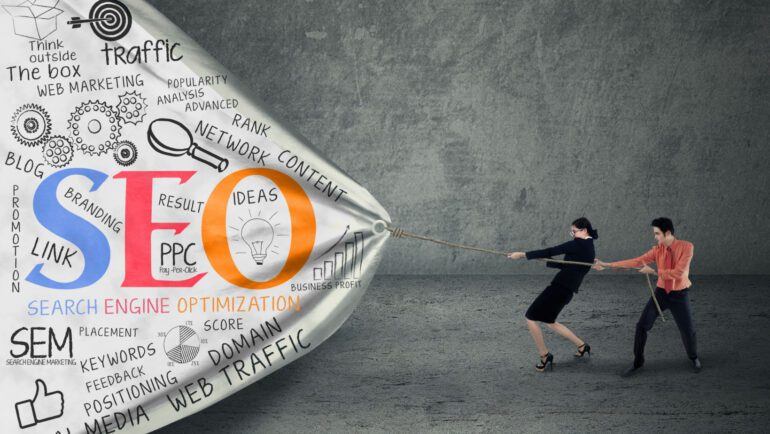TL;DR:
- AI SEO utilizes artificial intelligence and machine learning techniques to optimize websites for search engines.
- AI algorithms can generate high-quality, keyword-optimized content and provide recommendations for improving search engine rankings.
- Keyword research and on-page optimization can be enhanced with AI tools.
- Natural Language Processing (NLP) enables AI to understand user intent for better search results.
- AI algorithms can analyze backlinks and suggest high-quality links to improve website rankings.
- AI SEO offers faster, more scalable, precise, and personalized optimization compared to traditional SEO.
- AI SEO tools like SEMrush, Yoast SEO, Ahrefs, Grammarly, BuzzSumo, Surfer SEO, and Google Analytics are essential for effective optimization.
Main AI News:
AI SEO, also known as Artificial Intelligence SEO, is the use of artificial intelligence and machine learning techniques to optimize a website for search engines. With AI algorithms, businesses can analyze vast amounts of data and receive valuable insights and recommendations to improve their website’s content and structure, ultimately enhancing search engine rankings.
There are several key ways in which AI can be applied to SEO:
- Content Creation: AI algorithms can generate high-quality, optimized content based on relevant keywords and topics for the target audience. This helps improve search engine rankings and drive more traffic to the website.
- Keyword Research: AI tools can analyze search data and identify keywords that are relevant to the website’s target audience and have high search volumes. This enables businesses to target the right keywords and boost their search engine rankings.
- On-page Optimization: AI algorithms can analyze a website’s meta tags, headings, and other on-page elements to optimize them for better search engine rankings.
- Natural Language Processing (NLP): AI algorithms can analyze user queries and provide more accurate and relevant search results by understanding the intent behind the search query.
- Link Building: AI algorithms can analyze backlinks and provide recommendations for acquiring high-quality, relevant backlinks that can improve a website’s search engine rankings.
Traditional SEO and AI SEO differ in their approach to optimizing a website for search engines:
- Approach: Traditional SEO is a manual process that involves analyzing data and making optimization decisions based on experience and best practices. AI SEO, on the other hand, leverages automated algorithms to analyze data and provide precise recommendations.
- Speed and Scalability: Traditional SEO can be time-consuming and limited in scalability. AI SEO can analyze large amounts of data quickly and provide recommendations at scale.
- Precision: Traditional SEO may be prone to errors and inconsistencies. AI SEO algorithms are designed to analyze data accurately and provide more precise recommendations.
- Personalization: AI SEO can provide personalized recommendations based on the specific target audience, while traditional SEO is typically based on industry standards.
- Dynamic Optimization: AI SEO can adapt to changes in search engine algorithms and adjust optimization strategies accordingly, while traditional SEO may require manual updates and adjustments.
AI SEO tools can greatly assist businesses in optimizing their websites for search engines by providing accurate and personalized recommendations. However, it’s important to note that AI SEO is an emerging field, and working with experienced professionals is crucial to ensure the effective implementation of AI SEO strategies.
SEO writing tools are essential for content creators and marketers looking to optimize their content for search engines. These tools offer features such as keyword suggestions, content analysis, readability checks, and more. Popular SEO writing tools include SEMrush, Yoast SEO, Ahrefs, Grammarly, BuzzSumo, Surfer SEO, and Google Analytics.
By leveraging AI SEO tools and strategies, businesses can enhance their website’s search engine visibility, improve rankings, and attract more organic traffic.
Conclusion:
The integration of artificial intelligence into SEO practices has revolutionized website optimization. Businesses can now leverage AI algorithms to generate high-quality content, identify relevant keywords, optimize on-page elements, and build high-quality backlinks. AI SEO offers speed, scalability, precision, and personalization that traditional SEO methods cannot match. By utilizing AI SEO tools and strategies, businesses can significantly improve their search engine rankings, gain a competitive edge in the market, and attract more organic traffic to their websites.

